|
|
|
Sort Order |
|
|
|
Items / Page
|
|
|
|
|
|
|
| Srl | Item |
| 1 |
ID:
076578


|
|
|
| 2 |
ID:
149557
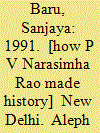

|
|
|
|
|
| Publication |
New Delhi, Aleph Book Company, 2016.
|
| Description |
216p.hbk
|
| Standard Number |
9789384067687
|
|
|
|
|
|
|
|
|
|
|
|
Copies: C:1/I:0,R:0,Q:0
Circulation
| Accession# | Call# | Current Location | Status | Policy | Location |
| 058918 | 923.2/BAR 058918 | Main | On Shelf | General | |
|
|
|
|
| 3 |
ID:
061504
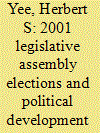

|
|
|
| 4 |
ID:
064750
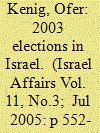

|
|
|
| 5 |
ID:
061417
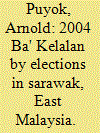

|
|
|
|
|
| Publication |
Apr 2005.
|
| Summary/Abstract |
In Malaysia, democracy is generally interpreted in electoral terms. Arguably, the current electoral system in Malaysia denies ordinary ordinary people their rights to elect their preferred representatives and contributes to the erosion of democracy. The 2004 Ba’ Kelalan by-election is a demonstration of the above predicament. This article argues that irregularities in the conduct of the by-election demonstrate how democratic rights had once again been denied. The article also shows how the Lun Bawang community plays a pivotal political role in determining the balance of power among the ethnic groups in Sarawak.
|
|
|
|
|
|
|
|
|
|
|
|
|
|
|
|
| 6 |
ID:
068787
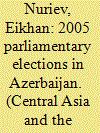

|
|
|
| 7 |
ID:
064851
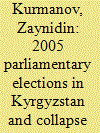

|
|
|
| 8 |
ID:
074088
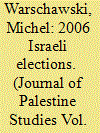

|
|
|
|
|
| Publication |
2006.
|
| Summary/Abstract |
This report looks at major trends shown by Israel’s March 2006 elections, despite the lowest voter turnout in the country’s history (fueled by disgust at corruption). Most important, the resounding defeat of the Likud and the Right in favor of the “center” confirmed a shift in political culture away from the Greater Israel ideology and permanent preemptive war against terrorism (i.e., the Palestinians) and the emergence of a broad consensus on unilateral separation (not peace), seen as the guarantor of security and normalcy. Also discussed are the early hopes raised by Amir Peretz’s election as Labor party head (and his subsequent domestication), the return of a certain discourse of social justice after years of uncontested neo-liberalism, and the durability of the “community” or ethnic vote. The letter ends with a look at coalition politics in Israel and the formation of the new government.
|
|
|
|
|
|
|
|
|
|
|
|
|
|
|
|
| 9 |
ID:
096823
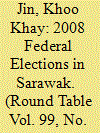

|
|
|
|
|
| Publication |
2010.
|
| Summary/Abstract |
In the aftermath of the 8 March elections, Sarawak was cast as an outlier, recalcitrant even, to the perceived 'revolt' against the incumbent Barisan Nasional. This short note attempts to show that Sarawak actually fell within the overall voting pattern viewed in its total range, rather than in summary outcomes. In that context, the note then attempts to argue that the voting patterns can be accounted for by local reasons, hopes and fears, particularly in the case of the minority indigenous groups collectively categorised as 'Other bumiputera'. However, Chinese and Malay constituencies exhibited a pattern clearly correlated to ethnicity.
|
|
|
|
|
|
|
|
|
|
|
|
|
|
|
|
| 10 |
ID:
086137
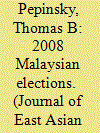

|
|
|
|
|
| Publication |
2009.
|
| Summary/Abstract |
Malaysia's twelfth general elections, held on March 8, 2008, dealt a stunning blow to the incumbent Barisan Nasional regime. For the first time since 1969, the coalition did not receive its customary two-thirds majority in the lower house of parliament. Moreover, the opposition was able to form governments in five out of eleven peninsular Malaysian states. This article uses electoral, economic, and demographic data to test a number of potential explanations for these outcomes. Evidence indicates that the regime's decreased majority is the consequence of non-Malay voters' rejecting the incumbent regime in favor of secular opposition parties.
|
|
|
|
|
|
|
|
|
|
|
|
|
|
|
|
| 11 |
ID:
127684
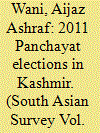

|
|
|
|
|
| Publication |
2011.
|
| Summary/Abstract |
A working democratic set-up provides ample space to mitigate the tensions in a society to a large extent. Unfortunately, democracy could not work in Jammu and Kashmir the way it is expected to work in a free society. Denial of democracy and misgovernance became almost an accepted way of political life in the state, which became one of the main reasons of the rise of militancy in the state. The 2011 panchayat elections provide the best opportunity to restore the confidence of the people in the democratic set-up by empowering the elected representatives in a real sense and bringing more and more people into the democratic setup. It also poses a great challenge to the government as far as fulfilling the democratic aspirations of the common people who have whole heartedly participated in this democratic exercise at the local level.
|
|
|
|
|
|
|
|
|
|
|
|
|
|
|
|
| 12 |
ID:
131095
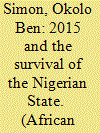

|
|
|
|
|
| Publication |
2014.
|
| Summary/Abstract |
Nigeria is currently faced with serious domestic challenges. While the state is not officially at war, it is standing on the precipice, especially with the eruption of violence occasioned by the emergence of the Boko Haram sect and the tenuous peace in the Niger Delta. With the 2015 general elections on the horizon, fears of further violence and disintegration are rife, more so because of the debate over who occupies the Presidential Villa at Abuja. President Goodluck Jonathan, a southerner, seems poised for a comeback even amidst the vociferous challenge posed by the political elites of northern Nigeria. This article looks at the different scenarios that might play out in 2015. It analyses the challenges of the survival of the Nigerian state, and makes some policy recommendations that Nigeria and its people need to put into place in order to ensure its survival beyond 2015.
|
|
|
|
|
|
|
|
|
|
|
|
|
|
|
|
| 13 |
ID:
147653
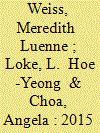

|
|
|
|
|
| Summary/Abstract |
The People’s Action Party’s unexpectedly strong win in Singapore’s September 2015 general election illuminates the dynamics of opposition under electoral authoritarianism. The conduct and outcome of the election raise questions not just of why the much-hyped opposition efforts fizzled, but also of the implications for Singapore politics, moving forward.
|
|
|
|
|
|
|
|
|
|
|
|
|
|
|
|
| 14 |
ID:
157656
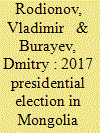

|
|
|
|
|
| Summary/Abstract |
The article analyzes the election of the President of Mongolia held in the summer of 2017. It concentrates on the foreign policy aspects of the election campaign. The main themes of the foreign policy aspect of the election were relations with Russia, China, and foreign investors. As to Russia, all candidates were unanimously in favor of drawing closer to it, but as far as China was concerned, heated discussions unfolded around the subject, which is explained by a whole range of problems existing in Sino-Mongo-lian relations.
|
|
|
|
|
|
|
|
|
|
|
|
|
|
|
|
| 15 |
ID:
174366
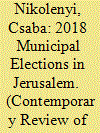

|
|
|
|
|
| Summary/Abstract |
This article analyzes the 2018 local elections in Jerusalem, the contested capital of the State of Israel. These elections were unique in terms of their level of competitiveness and fragmentation as well as producing a highly divided local government in the wake of the incumbent mayor’s, Nir Barkat’s, decision to leave the local political scene and enter national politics. While his party has no representation in city council, the new mayor of Jerusalem, Moshe Lion, built a broadly based new coalition that includes all parties in the council except for Hitorerut, the party that won the most seats and whose mayoral candidate, Ofer Berkovitch, was the runner-up to Lion. With the exception of the ultra-orthodox parties, national political parties that sought to interfere with the local electoral process to promote their candidates and lists by and large failed. Therefore, the governance of the city of Jerusalem once again fell under the control of the ultra-orthodox majority. Furthermore, even though the Arab population of East Jerusalem largely continued its traditional abstention from the electoral process, there was some evidence to suggest that a slight shift was taking place in that community in favor of participating in the institutional process of municipal government and democracy.
|
|
|
|
|
|
|
|
|
|
|
|
|
|
|
|
| 16 |
ID:
187567
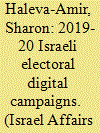

|
|
|
|
|
| Summary/Abstract |
This article focuses on the three Israeli digital campaigns during 2019–20 elections through their most prominent negative trends, namely: fake news, accounts and identities; politicians’ chat bots; influence and interruption networks, illegal information accumulation on Israeli citizens via social media and voting apps; anonymous and fake spam, and a complete lack of compliance with the statutory and regulatory framework. With technology’s speedy advancement, legal tools’ lagging, and political actors’ exploitation of the situation to their benefit, it seems that these campaigns, setting forth a fifth phase of political communication – Algorithmic Campaigns – constitute a rather bleak and grim future, as far as elections are concerned, thereby calling for rethinking.
|
|
|
|
|
|
|
|
|
|
|
|
|
|
|
|
| 17 |
ID:
185526
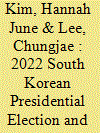

|
|
|
|
|
| Summary/Abstract |
The 2022 South Korean presidential election was the country’s most closely contested election since a democratic direct electoral system was initiated in 1987, with less than a 1 percent difference separating the two major candidates among 34 million votes cast. Despite some parallels with and continuities from previous elections, the 2022 election saw new voting alignments emerge based on one topic: gender equality. In this essay, we explain how and why gender became such a prominent issue during the 2022 election campaign, and how this affected voting patterns, especially among male and female voters in their twenties and thirties. Specifically, we argue that gendered voter behaviour during the election arose from rising anti-feminist sentiments among young men, and that the two main presidential candidates politicized the issue to maximize support from this group. This in turn triggered the consolidation of a young female voting bloc. Using an original survey conducted in January 2022 with an approximate nationally representative sample of 1,017 respondents, we identify two possible causes of rising anti-feminist sentiments among young men: the belief that women receive preferential treatment in employment opportunities and mandatory military service for men. In addition, through an embedded survey experiment run before the election, we proposed that political candidates with pro-gender messages would be less likely to receive support from young men, while candidates with anti-gender messages would be likely to receive more support; these projections were confirmed by the actual voting breakdowns of the recent election. The results suggest that the new administration must handle gender issues with extreme care to ensure that divergent perceptions of the gender divide do not become further polarized over the next few years, since such a development could very well fuel democratic deconsolidation in South Korea.
|
|
|
|
|
|
|
|
|
|
|
|
|
|
|
|
| 18 |
ID:
091135
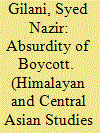

|
|
|
|
|
| Publication |
2009.
|
| Summary/Abstract |
On the eve of elections in Srinagar, three important statements have been made and these need an examination in public interest: "we appeal the people of Srinagar to remain away from the election drama as a gratitude to the lakhs of Kashmiris who sacrified their lives for resolution of Kashmir dispute according to their aspirations."
|
|
|
|
|
|
|
|
|
|
|
|
|
|
|
|
| 19 |
ID:
094486
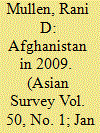

|
|
|
| 20 |
ID:
103631
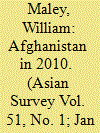

|
|
|
|
|
| Publication |
2011.
|
| Summary/Abstract |
Afghanistan in 2010 witnessed a number of important events including cabinet changes, legislative elections, and several major international conferences focused on its problems. It continued to be confronted by long-term problems of insecurity, compounded by uncertainty about both the trajectory of U.S. policy and the legitimacy of its own rulers.
|
|
|
|
|
|
|
|
|
|
|
|
|
|
|
|
|
|
|
|
|